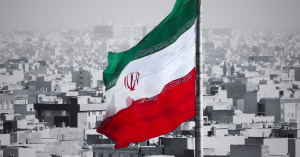During the past 10 months, Ukraine’s embattled tech sector has proven to be one of the foundations on which the country has built its resistance against the Russian aggression.
It has offered support for its army in cyberspace with initiatives such as the IT army, and many startups and tech companies have also brought up innovative technologies or logistical support which have also been used on the battlefield.
Surviving under such conditions, Ukraine’s tech sector has also managed to rebrand itself and the country in the process.
According to Ukrainian techpreneurs, efforts from the brave Ukrainian people have also spilled into many industries in the country, illustrating just how much people and businesses want to defend their homes.
“The brand of Ukraine, “Bravery” has become a reflection of our spirit and the struggle of Ukrainians, as well as unity and mutual assistance. From the very first days of the invasion, people became volunteers, helped IDPs, restored the economic front, and joined the fight against disinformation and cyber warfare,” Viroslava Novosylna, CEO of PR agency SLOVA Tech and co-founder of the international non-profit community of Wtech (Women in Tech) tells The Recursive.
“Be brave, like Ukraine”
Despite all the hardships that the country and its people are facing on a daily basis, such as air raids, shelling, and the energy crisis, business and IT industries of Ukraine continue to work and scale. This alone has also contributed towards a different image for Ukrainian IT professionals abroad.
“After the breakout of the war, Western companies started treating Ukrainian IT professionals cautiously. Some went as far as to stop their cooperation with Ukraine-based employees and contractors. But, with time, global businesses once again started seeking Ukrainian tech pros in- and outside of Ukraine. Job sites that only targeted Ukrainians started to emerge,” Daria Leshchenko, CEO of Kyiv-based customer support service SupportYourApp, tells The Recursive.

While at first this was mainly seen as a part of a humanitarian effort since a lot of Ukrainians lost their jobs and sources of income, it also signaled a display of trust in the Ukrainian workforce.
“Clients and partners are also surprised and impressed by the resilience and work ethic of their Ukrainian consultants and staff. They see we don’t want sympathy, and that we just want the opportunity to work and free our country,” business development manager Kateryna Hoiman tells The Recursive.
“The world saw — Ukrainians can work effectively and deliver stunning results under any conditions. There is a saying — “Be brave, like Ukraine”. It can now be heard or seen anywhere in the world. I think it best describes what the brand of Ukraine is associated with in the modern world. The same applies to Ukrainian companies,” Leshchenko adds.
A study by the IT Ukraine Association also shows that during the first ten months of 2022, the IT industry brought $6 billion in export revenue to the Ukrainian economy and achieved 10% growth compared to the previous year.
According to Anna Kozlova, CEO of video game-dev holding company Room 8 Group, such developments have also contributed to a change in how Ukrainian IT companies are perceived worldwide.
“Ukrainian teams can offer not only technical talent (which was well-known before) but also high quality, creativity, and reliability. Despite all the hardships that Ukrainians faced this year, they kept on with their diligent work and never stopped pushing the boundaries of creativity and offering great quality. This is very well seen both in our industry and in general. Ukrainian specialists are perceived as hardworking and responsible, which we are genuinely proud of,” Kozlova tells The Recursive.
Additionally, the new tech solutions that Ukrainian tech companies are coming up with during the war can also serve as an inspiration for people in the country and abroad.
“Technologies and founders of cool IT solutions could be a real example of how ordinary people without connections can have a huge impact on society and motivate other like-minded young people to take this path. I believe all these results, our tech focus as a country (similar to Israel and Estonia) and people’s strength already gives Ukraine good attention,” Iryna Savytska, CEO and co-founder of Web3 platform for storing data Bank of Memories, explains.
Various tech initiatives to boost the country’s spirit and morale
Aside from the now famous Ukrainian IT army, there have been many other initiatives in the tech sector that have been established in order to boost its spirit and morale.
Agencies such as Novosylna’s SLOVA Tech have joined the Ukrainian PR army – a coalition of communication experts working to strengthen the presence of Ukraine and Ukrainians in the global information field.
There is also the Bathtub Creative, a full-service agency fully based in the bathtub, reflecting the harsh reality and difficult working conditions that most Ukrainian professionals are experiencing right now.

PR manager Julia Petryk is one of the founders of the agency, and as she explains the idea for the agency came from the necessity of keeping busy with work to mentally escape the struggles of daily life during the Russian invasion.
Petryk, like many others across so many industries in Ukraine, are forced to work from the safety of their bathrooms during active and constant attacks.
“Ukrainians show unbelievable resistance while living, working and studying during these tough times for our country. Because of the recent attacks on our infrastructure, Ukrainians need to adapt to blackouts now. However, even under such harsh circumstances, we know that our freedom is worth it,” she tells The Recursive.
The sentiment is also shared by Alex Fedorov, CEO of IT company OBRIO, who shares that for most Ukrainian professionals work itself has become a kind of a “magic pill” to calm down and stop thinking about the war for a while.
“I think the fact that Ukrainian IT companies remain full-operational businesses, even with occasionally raising funds and growing opportunities, describes our companies as highly-sustainable and stress-resistant businesses. This only makes our teams resilient to any “black swans” in the future. When the war is over, I think this will become a competitive advantage for our IT sector, in a way,” Fedorov tells The Recursive.
The impact of Ukraine’s global brand and further investment in its tech sector
A country brand is about popularity and being attractive not only in terms of tourism, but also in terms of investment. And while when the war began on February 24th, IT-based business consultants were concerned that Ukraine had lost its investment attractiveness, this didn’t prove to be the case.
“In reality, however, we can see that Ukraine’s brand is still strong. After the first shock was over, many clients reevaluated risks and eventually were back,” Vlad Koval, Artem Barmin and Oleksandr Slobozhan from Ukrainian software development company Freshcode tell The Recursive.
“As you know, a strong economy is a foundation of victory. Thus, we are looking for government initiatives to support the IT sector. Of course, agrarians, industrialists, and other specialists need support too, but right now, while the war is still on, the IT sphere is the straw for Ukraine that is worth grasping,” the three entrepreneurs emphasize.
The brand of Ukrainian resilience also helps IT companies to keep customers and make them confident in service quality.
“Our clients and partners understand that no matter what, a hurricane or an apocalypse will not stop Ukrainians from doing their job well and succeeding. That is why trust and respect have grown towards us as professionals who work no matter what. It also places a great responsibility on us so that there are no doubts about our ability to work and conduct business competitively with global countries,” Andrew Byzov, CMO of corporate training platform AcademyOcean tells The Recursive.
For Kyiv-based PR specialist Aliona Guseva, the image that Ukraine is aiming to have right now is that it is capable of creating companies, products, and brands not because of circumstances, but in spite of them.
“In this regard, we are setting a kind of bar for other states — that if there is a desire and an incentive, resources will certainly be found even during a war without electricity, heating, water supply, and time and communication. Yes, we spend a lot of power on fighting the enemy, volunteering, many industry specialists are currently at the front, 13% have been relocated abroad, but in general, we are keeping the bar that we set for ourselves at the beginning of the year and transforming reality while accepting its constant unpredictability.” Guseva concludes.








